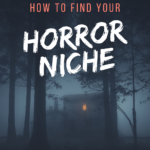So if you’ve been subscribed to the newsletter for a while now you know that I occasionally like to break up the weekly books recs to talk about something horror-related, or horror reading–related in this case — that has caught my attention. This week it’s reader burnout, finding your niche(s) in the genre, and having that be okay. Horror is a massive genre. We have the full complement of sub-genres, and our sub-genres have sub-genres/categories/things. Many of which overlap! That’s a lot of ground to cover for a newbie horror reader, which I was just a couple of years ago. It can be intimidating, like approaching a series with 13 books except it’s a whole genre with thousands of books. Picking a place to start, I have found, happens in one of a couple of ways. Some new readers slide in from other related genres like dark fantasy, true crime, or thrillers. Others decide that they want to try horror and they just dive in blind and start feeling their way around. Regardless of how a horror reader gets their start, one thing remains constant: it always starts with a book, that leads to another book. Then the next thing you know, you’re a horror reader. And in the beginning, you want to try everything. Sample every sub-genre, every writing style, every format from poetry to full-length novels. And that’s good! That’s exactly how you should go at a new genre because it’s the best way to figure out what you’re going to love, what you’ll only like, and what you will definitely not want. But, like I said, it’s a lot of open ground. Eventually you have to narrow your field, or you’ll keep trying to push yourself to read everything and you’ll burn out on the genre and all the fun will go out of your reading. Ask me how I know. I love horror. But I may, just slightly, have over done it in the last year. And suddenly I was looking at stacks of horror in my TBR and found that I had 0 interest in like 40% of them. I thought “Well. That’s it. So much for my newsletter. I’m off horror.” Which, I’ll grant you, was a bit of an overreaction but hey. 2021. Also known as 2020: The Re-twentying. But my problem wasn’t that I’d gone off horror. It was that, without realizing it or at least without acknowledging it, I had refined my preferences in the last two years. I had realized what I loved and wanted in horror and what I didn’t. Yet I was stuck on this idea that I had to be reading ALL the horror, and it was throwing up a roadblock because in the end I just didn’t want to. There are some horror books that I’ve read that I regretted reading because they left me feeling gross, or disturbed, and put images in my head I’ll never unread. And some people want that from their horror, and that’s great! That’s their kind of horror. But I don’t like feeling like that, which is probably one of the reasons that — as I’ve mentioned before — I like my horror to end on an upbeat note. And thinking that I had to read horror I didn’t want to read completely killed my fun. There’s no greater thief of joy than homework reading. I guess what I’m saying — the point of all this — is that it’s okay to cherry pick your horror. It doesn’t have to interfere with your ability to read diversely! Whatever your horror poison of choice is, more likely than not you can find diverse recs for your reading list. That’s the beauty of a big genre that grows in diversity every year! You can pick the books you want to read and ignore the rest, even if “the rest” are bestsellers and the hot picks on everybody’s lists. You don’t have to read “the next big horror novel” if it’s not your thing, even if everyone else is reading it. Sometimes we get so caught up in being professional readers, especially if you’re a blogger or a reviewer, and we feel like we have to read what’s new when it’s new even if we aren’t feeling it. So if you are one of those people, like me, who need permission: here it is! Read what you love and you’ll keep loving the genre you read.










